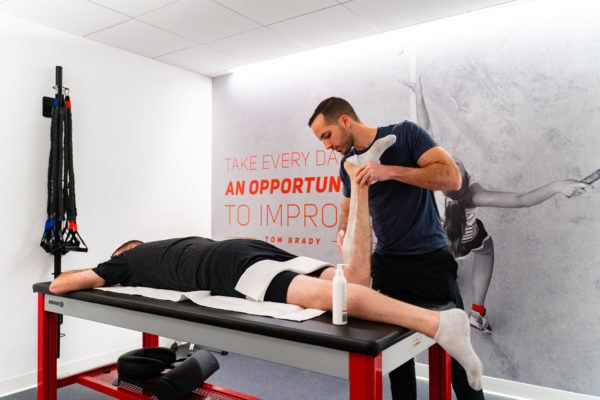“As a soldier, you want your muscles to fire at 100 percent but then be able to relax so that they can recover and re-educate [themselves] to be able to absorb forces. So, it isn’t just what we do here at TB12, but what you do at home,” Gilman explained to me.
So when allowing the muscles to recover effectively, you should also lengthen and keep them soft. That is the opposite of what we as SOF have preached for generations. Didn’t we want hard-muscled, barrel-chested freedom fighters in SOF? Not according to the TB12 method.
TB12 believes that adequate hydration requires drinking roughly half your body weight in ounces of water a day. So, if you weigh 220 pounds, you should be drinking 110 oz of water per day. I thought I drank a lot of water per day, but according to their program, I’m running a little low. As Chuck put it, if a muscle is a bit dehydrated it is like beef jerky. It gets stiff and inflexible.
Another key part of the TB12 prehab/recovery/performance program is proper nutrition. As Gilman told me, “as we train to a standard, we need to properly fuel our bodies to the same standard. And it isn’t just the muscle pliability work we do, it isn’t just the workout, it is the entire package of what we do. It is the entire mindset of how we prepare.”
Moderation is the key to this. The TB12 Body Coaches preach small changes at first — like increasing the number of anti-inflammatory vegetables in our diet.
TB12’s message is to become the best version of yourself that you can. In terms of TB12 workouts, the Body Coaches first perform a movement analysis to determine how you move and how your joints are working. You walk barefoot on a treadmill that has cameras located around it to film your stride. Computers are connected to the treadmill to measure your gait. Then the Body Coaches repeat the process with your workout shoes on.
TB12 focuses on symmetry, and obviously the goal is to have zero percent difference between your left and right side (though under five percent is okay). Having been injured on the left side, the results of my scan were predictable. While walking barefoot, my right side, compensating for the left, was working 5.4 percent more. With shoes on this difference rose to 8.8 percent.

The key to rectifying this is to perform muscle pliability work focused on the muscles around your joints to help lengthen and soften the muscles. This isn’t your run of the mill massage — if you’ve ever seen the video of Guerrero working on Brady before a game, it will give you an idea of how intense this is. Having suffered for 20+ years of chronic pain, everything on my body was tight. Chuck commented that I had the tightest calves of anyone he’s ever seen, and every one of those muscles has to be loosened up for the program to work. The 30-40 minute muscle pliability session can be excruciatingly painful at times, but by the time it was done, my entire body was loose and more relaxed.
You don’t have to visit a TB12 Body Coach to develop pliable muscles, though. TB12 advocates for “self-pliability” movements both before and after each workout using a proprietary pliability roller that has a built-in vibration unit that helps to stimulate the nerves in each muscle group and increases overall pliability. The pliability roller worked much better than the standard foam roller I normally use.
Many have said that the TB12 workout is anti-weights, but that’s not the case. TB12 isn’t anti-weight at all but is very pro-resistance bands. It uses the bands for everything, as they come in a variety of widths and lengths that provide peak contraction throughout the entire range of motion for nearly any exercise imaginable.
Exercise movements at TB12 are designed to be done quickly to mimic the movements one would make on a sports field or when conducting a mission. Their philosophy is, you won’t be doing a slow, controlled movement on a football field (or in this case a battlefield), so you should prepare your body by training fast. Those old soldiers will remember the old axiom, “we train as we fight.”
We’ve all used bands before, but the TB12 system incorporates bands much more effectively and makes it easy to work out just about anywhere. They make their wide assortment of bands available with a door anchor and snap links that make the system very portable. Once the workout ends, it’s back to the roller to finish up with some pliability work.
This combination of muscle pliability work, adequate hydration, balanced nutrition, and functional strength and conditioning is the core of the performance lifestyle that TB12 uses to train their clients. Not only does it work extremely well, but it can also be maintained by operators both at home and in deployment. It will cut down on injuries while improving the recovery time.
I wish this system was around back in the day, and we could have had Body Coaches on staff. Perhaps a lot of retired members of the community would be walking a lot better now.










COMMENTS